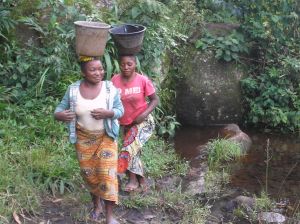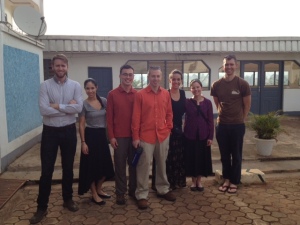An Engineers Without Borders’ Assessment trip is an opportunity for our members and the community, to understand each other better, and lay the groundwork for implementing community development projects. As our team is currently in Cameroon, one of their primary task is to assess the community’s water needs and conduct a feasibility study for an improved water distribution system. The community of Mbokop has already indicated that they want improved water infrastructure, but on this assessment trip, we will study their existing resources and infrastructure, while collecting simple baseline metrics to guide our design.
Here are some of the tasks our engineering team plans to accomplish on the first assessment trip:
- Examine the existing infrastructure – Before we set out to design a new system, we need to have a good understanding of the short-comings of the existing system. Currently the community uses a combination of spring and river sources, and has some stand pipes for water collection. We need to identify where these sources are, if there are potential sites of contamination, and the water usage pattern. There might be a chance that we can fix their current water infrastructure and make some additions instead of building a completely new system.
- Assessing the water sources – The team will be conducting water quality and quantity tests at various sources and point-of-use locations throughout the community. Gastrointestinal diseases are rampant in the community, so we will focus heavily on bacterial contamination.
- Mapping the community – Using several GPS units, we will create a map of the community, showing the location of the houses, the water sources, collection points and other points of interest (school, clinic, pastoral grounds, etc.).
- Water Demand and usage – As part of the focus group meetings, we will gauge the water demand in the community and understand their usage. We will also collect information about seasonal variations in the water supply/demand.
- Water and land resource rights – Our team will gather information about water and land resource rights within the community, and other legal aspects we need to keep in mind to ensure our project is in-line with Cameroonian law. EWB projects are meant to benefit the community as a whole, and should never favor a subset within the community (tribe, sector, religious group, etc.).
- Material availability – The EWB team will conduct a material availability survey in Mbokop and in the nearby cities of Ndu and Bamenda. To ensure project sustainability, all materials used in the community will be attained locally.
- Gauge understanding of water and environmental resources – Through our conversations with the community and the water committee, we will gauge the community’s understanding of water use, contamination and environmental issues.


